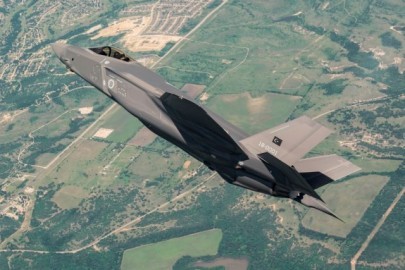The F-35 is a U.S.-manufactured fifth-generation combat platform with stealth capabilities, probably the best fighter jet in the world. (Israel just received its first F-35 jets, and has used them operationally over Syria.)
Turkey is planning to acquire at least 100 F-35 fighter jets, the first of which is scheduled to be delivered in 2019. Delivering such a war machine to Turkey – an authoritarian, Islamist-leaning state that undermines Western interests in the region – would be a big mistake.
Under the leadership of President Recep Tayyip Erdogan, Turkey has long stopped behaving as a reliable Western ally, even though it is still a formal member of the NATO alliance. Instead, Turkey has succumbed to Ottoman and Islamist impulses, and it seems to have imperial ambitions.
Turkey is spending large amounts on arms procurement and on building a domestic military industry intended to bolster its ability to project power beyond its border. It is intervening militarily in Iraq and in Syria. It has used military force against Kurds in Syria (an important American partner in the war against ISIS). Turkish-sponsored militias may yet confront American forces in Syria.
Ankara is also very hostile to American allies in the region. Turkish fighters regularly violate Greek airspace, underscoring Turkey’s desire for a revision in the international border. It bullies Cyprus (a third of which is occupied by Turkey) by sending its navy to intervene with gas explorations in Cypriot continental shelf waters. Turkey is also challenging the legitimacy of President Abdel-Fattah el-Sissi in Egypt (who deposed the Muslim Brotherhood former President Mohammed Morsi). Ankara opposes the Saudi attempt to isolate Qatar (a country that supports the Muslim Brotherhood and that is cozy with Iran). Similarly, Turkey’s relations with Israel have been strained. And at the same time, Turkey is nurturing good relations with Russia, China and Iran.
The Barack Obama and Donald Trump administrations have failed to significantly signal their displeasure with Ankara, allowing Turkey to pursue policies that are inimical to the American interest. It is time to change that. It makes no sense to strengthen Turkish military capabilities, and therefore the sale of F-35 jets to Turkey should be halted.
Telegraphically, here are 10 reasons why the F-35 sale to Turkey should be tanked:
- The sale by America of F-35 fighter jets abroad is meant to be a booster for the capabilities of U.S. allies. Turkey hardly qualifies any longer for this title.
- Delivering the F-35 to Turkey would indicate American support for Erdogan’s Turkey. Yet, Turkey is an increasingly authoritarian Islamist regime. Under Erdogan, infringements on human rights have gradually increased resulting in a “Putinization” of the Turkish political system. The military, once the defender of the Kemalist secular tradition, has been successfully subordinated by the Islamists.
- Supplying F-35s will significantly strengthen the capabilities of the Turkish military to make mischief in the region. Erdogan may decide to use the upgraded air force to establish himself as arbiter of developments in the eastern Mediterranean and other parts of the Middle East, or to interfere with Israel’s air supremacy, or even to attack Israel.
- The planned delivery of the Russian-made S-400 air defense system to Turkey, a procurement that has antagonized NATO members, makes the F-35 deal very problematic. If Turkey integrates the American-made F-35 and the Russian-produced S-400, details about the airplane operating systems might leak to the Russians. Thus, F-35 security could be compromised in other arenas where the jet is deployed.
- Turkey might facilitate Russian access to data about American weapon systems on the F-35.
- Leakage of sensitive information and technical details of U.S. weapons systems to Tehran is also a distinct possibility since Turkey is developing warmer relations with Iran.
- Eskisehir, in Turkey, has been chosen as an industrial hub for the production of F-35 engines and as a maintenance hub for all European operators of the F-35. This too is a mistake. It could create a problematic logistical dependency upon a country whose political direction is uncertain.
- This could result in the transfer of state-of-the-art technology to Turkey and increase the capabilities of the Turkish domestic arms industry. This would reduce Turkey’s dependence upon foreign suppliers, enhancing its freedom of action.
- The economic benefits of the F-35 deal for Turkey are evaluated at over $12 billion, thus aiding the fortunes of an Islamist regime. It is unwise to confer such advantages on a country whose behavior is not helpful to the U.S.
- Arms sales should be subordinated to paramount political and strategic considerations. American economic fears of losing the Turkish arms market should not supersede the negative strategic ramifications of the transaction.
In sum, the sale of F-35 fighter jets to Turkey must be stopped.
* Professor Efraim Inbar is president of the Jerusalem Institute for Strategic Studies, jiss.org.il.
Source: israelhayom
Ask me anything
Explore related questions





